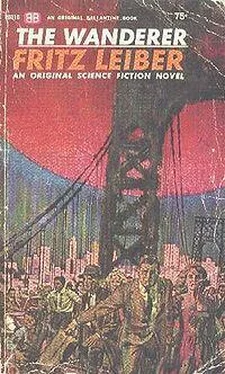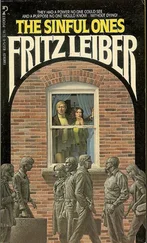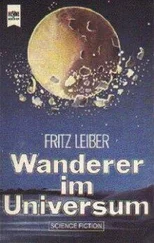Without warning the saucer began to mount very swiftly. First the ice cap, then the whole Earth, shrank rapidly.
Paul repressed his reactions. Excited emoting was not admired feline behavior and he already knew that Tigerishka could work the control panel without touching or even looking at it.
Stars came out everywhere. As Terra continued to shrink, the Wanderer came sliding into view. It too had a polar cap of sorts, a lopsided yellow one against the violet background, but with a yellow neck going down from it — the neck of the dinosaur. From here the yellow shape was like a battle axe.
They were mounting at right angles to the sunlight: none came directly into the saucer. The two planets below began to show half phases, the Wanderer with the crescent of moon fragments out to its sunward side.
It grew dark in the saucer as the ice light faded. When the planets finally stopped shrinking, they were two small, almost indistinguishable half moons, not very far apart, against the starfields, largely unfamiliar to Paul, which one sees from the southern hemisphere.
With no great amazement he realized that the saucer had mounted several million miles in less than a minute — something not too far below the speed of light.
The effect was as if he and Tigerishka, walking through a city, had retreated into a big unlit park and were now seeing the lights of the city across several acres of dark lawn and trees. After a bit, it did begin to feel very lonely.
Tigerishka said quietly: “You feel like God? The Earth your footstool?”
Paul said: “I don’t know. Could I change the past? If someone were dead, could I bring him to life?”
Tigerishka did not answer, though it seemed to Paul in the darkness that she slowly shook her head.
There was a time of silence. Then Tigerishka made again the short melodic sound that was a little like a sigh. Then, softly: “Paul?”
“Yes?” he asked quietly.
She said, softer still, but rapidly: “We are wicked. We hurt your planet terribly. We are afraid.”
She went on, this time not quite so like a little girl confessing naughtiness: “Your lost generation, your Hungarian refugees, your anarchists, your Satanists, your beats, your fallen angels, your parole-jumpers, your juvenile delinquents — we’re like those. Running, running, running. Every step, pounding the hollow planetary pavement under the cold streetlights of the stars: a billion light-years.”
He knew she was picking the words, concepts, and images out of his mind, yet his mind did not feel it at all.
She continued: “The Wanderer is our getaway car, our escape wagon — a very hip and handsome Dunkirk ship! Fifty thousand decks for fun and games! Skies to suit every taste — sunsets to order! Hot and cold running gravity in every stateroom — pro or anti, take your pick! The Star of the Rejected. Satan’s Ark!”
And now it was the voice of a rather bigger girl, covering guilt with bravado and with lurid images chosen with a deliberate facetiousness.
She went on: “Oh, what a stylish Planet of the Damned! We paint our air on top for privacy. That shocked them in the solar slum we swung in. Those drab conformists thought we must have naughty things to hide behind our two-toned glamor. Well, we did!”
“The Painted Planet,” Paul murmured, trying to match her mood — and use at least one image before she did.
She flashed back: “Like your Desert, yes. And your wild painted women, no? Violet and yellow, like a desert dawn. We even paint the Wanderer’s boats to match — launches bigger than liners, dinghies like this. Oh, we’re the top of the mode, we are, we passengers on Satan’s Ark, we devil host, we angels going bump!”
She grinned swiftly at him, wrinkling her muzzle, but then she looked out again at the stars and down again at the two half moons, and her voice grew a little graver, though not entirely grave.
“The Wanderer sails the true void: hyper space. You want a rugged roadway, a cruel sea, a storm that makes a hurricane seem a breeze, a nova-front, a match-flash? Try the void! Formless as chaos, hostile to all life. No light, no atoms, even, no energy we superbeasts can tap — as yet! It is like quicksand you must tunnel through, or like a killing desert, waterless, which you must cross to reach a star with palms. A black, malignant seething that’s to space as the unconscious is to consciousness. Alleys to which the streetlight never gets, mouthless and twisted, full of dirty death — or dark, cold, oily water under docks, roiled by great waves. The Sargasso of the Starships! The Graveyard of Lost Planets! Oh, a most charming sea for Satan’s Ark, giving his angels nausea and nightmares — the flaming, freezing, formless Sea of Hell!
“This whole star-marqueed universe of ours — the cosmos you think rock-based, firm as God — rides in the endless hyperspatial storm just as a paper scrap might ride the whirlwind’s gust And…the Wanderer sails only in the fist of wind that holds the scrap. We’re timid sailors; we always hug the coast”
Paul stared out at the randomly scattered, lonely stars and wondered why he had always so easily accepted that they represented order.
“The power of a billion fission piles,” Tigerishka went on, “are what you need to burst into the void — and still more power, fantastic subtlest skill, and luck, too, to burst out. The Wanderer eats moons for breakfast and asteroids for snacks! Or rather, they are eaten by the void the Wanderer sails through, that gobbler of neutrinos — food tossed to hyper-spatial wolves to buy our way.
“It takes no time to travel hyperspace, except the launching and the landfall times,” Tigerishka continued, “but oh, the wit it takes to spy your port, the waits before you burst back to the world! — like threading an unknown coast in thickest fog. In hyperspace there are signs of our space here — shadows of suns, of planets and of moons, of dust and gases and of emptiness — but they are far more difficult to read than radar in a sky chockful of foil, than unknown, drip-worn, lime-brushed hieroglyphs within a cavern half as old as time.
“We ended this last trip battered and strained, starving for mass and sunlight. Our insulation from raw hyperspace had shrunk to zero; we almost lost our sky and atmosphere; no one could venture on our upper deck except the inorganic giants which dwell there — the crystal minds which are like colored hills.
“At that we made two false exits in your system, each gobbling up some cubic leagues of fuel we could not spare, but each time had to cancel because the signs weren’t right or else the vectors wrong, the exit spots not near enough your sun or to a moon that wholly suited us.”
Paul interposed automatically: “Only two false exits? There were four photos of twisting starfields.”
“Four photos, but only two false exits — one near Pluto, one near Venus,” she asserted sharply. “Don’t interrupt me, Paul. We finally managed our exit near your moon, the eclipse line-up making a perfect shadow. We surfaced from the sea of hyperspace. But we were almost powerless by then. Why, if we’d had to do battle we could barely have thrown the Wanderer into null gravity for maneuvering.”
“Tigerishka!” Paul protested. “You mean you could have nullified the Wanderer’s gravity field, so that it wouldn’t have caused quakes and huge tides on Earth — and you didn’t?”
“I’m not the Wanderer’s captain!” she snarled at him. “Besides, we had to have full gravity to catch and crush your moon, don’t you see? Full gravity augmented by local churn-fields and torque-volumes. And even in the worst emergencies we must maintain a general fuel reserve for battle — that’s obvious, surely!”
Читать дальше










